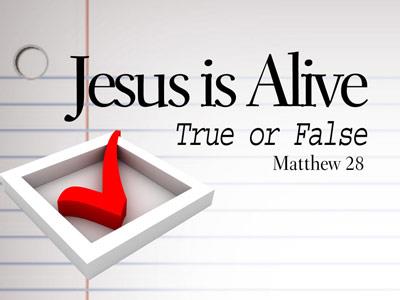-
Is He The Christ? Series
Contributed by Dennis Davidson on Nov 28, 2017 (message contributor)
Summary: If Jesus’ authority to not only interpret the Sabbath but also to work on the Sabbath indeed comes from God, then Jesus is making a messianic claim. This claim opens the way to questions concerning His origins—divine origins. Is He the Christ?
JOHN 7: 25-36
IS HE THE CHRIST?
The force of Jesus’ argument with the authorities seems to impress many in the audience who are either residents of the city or pilgrims in Jerusalem for the Feast of Tabernacles. Thus a shift in subject springs from Jesus’ last answer. If Jesus’ authority to not only interpret the Sabbath but also to work on the Sabbath (as God does, see ch. 5) indeed comes from God, then Jesus is making a messianic claim. This claim opens the way to a new line of questions concerning His origins — His divine origins. Even the failure of the authorities to stop Jesus lends intrigue to the crowd’s observations. Perhaps the authorities are reluctant to interfere due to some of them secretly believing He is the Christ? Is He the Christ?
I. MESSIANIC CLAIMS, 25-30.
II. SEVERE DIVISION, 31-32.
III. TO FOLLOW HIM OR NOT, 33-36.
The people were confused about the conflict between Jesus and the religious authorities. The crowed of pilgrims seeks further answers to the conflict in verse 25. So some of the people of Jerusalem were saying, “Is this not the man whom they are seeking to kill?
The people knew the dominating, ruthless, manipulating authority of the Jewish leaders in their society. They knew the Pharisees would not mess around nor put up with anyone who upset the status quo, who challenged their right to control. Any one who publicly opposed them and their traditions so openly was doomed. They knew the outcome of Jesus’ bold words should be His death. It is possible also that some knew of an actual plot to kill Jesus though they were not involved in it.
Since the religious authorities controlled the merchandising area of the temple court where Jesus was teaching the people reach a possible conclusion in verse 26. “Look, He is speaking publicly, and they are saying nothing to Him. The rulers do not really know that this is the Christ, do they?
Jesus’ teaching in the power of the Spirit made a favorable impression on the crowd. Some of them actually wondered whether the rulers failure to arrest Him was because they recognized His claims to be the Christ were true. [The question expects an affirmative answer.] This leads to a discussion of His origins.
Three commonly held beliefs are discussed in the following verses. The first is mentioned in verse 27. “However, we know where this man is from; but whenever the Christ may come, no one knows where He is from.”
In a culture without surnames, the place of origin was a means of personal identification. “Jesus son of Joseph” or “Jesus of Nazareth” (1:45) or “Joseph of Arimathea” (19:38) are typical identifiers. Once again the misunderstanding of the crowd is displayed by their question. The crowd is examining Jesus on an earthly level and think that since they can trace Jesus’ human origins, He is disqualified from messianic status.
There was a popular tradition that the Messiah would simply appear supernaturally or come out of a hidden place suddenly, mysteriously and Jesus did not pass it. For these Jews, Jesus’ commonplace appearance disqualified Him completely. But those of this tradition were ignoring the Scriptures that clearly predicted the Messiah’s birth (Isa. 7:14) and birthplace (Micah 5:2).
Jesus leaves the questions of His origin unanswered and in verse 28 goes on to make another astounding claim. Then Jesus cried out in the temple, teaching and saying, “You both know Me and know where I am from; and I have not come of Myself, but He who sent Me is true, whom you do not know.
There is irony here in the statement so you think you know Me and My origin. While there is a sense in which that is true, He came from Nazareth, in the a far more importance sense they do not.
He has come from God and knows Him with an unparalleled intimacy (Mt. 11:27; Lk. 10:22). This is paramount to a divine claim that breaks with all of the precepts of Judaism. A Messiah might be powerfully sent by God, but Jesus is claiming to know God and be something of a personal liaison or confidant — a Son! — who now has authority not just because of His unequaled wisdom but also by virtue of His divine origins. The Father’s power rests not simply what He does but in who Jesus is. As in chapter 5, Jesus says again that the Jews’ inability to comprehend this reality is evidence of their ignorance about God Himself (7:28; cf. 5:42). If they knew God they would recognize they Son.
Those searching for the way to know God must hear verse 29. “I know Him, because I am from Him, and He sent Me.”
The I’s are emphatic. The claim is simple, straight forward, and possessed with unimaginable glory. No one truly knows the Father but His Son with whom the Father shares His deity (or divinity) and purpose. As Jesus claimed His teaching came directly from the Father so now He claims His mission comes directly from the Father.

 Sermon Central
Sermon Central



